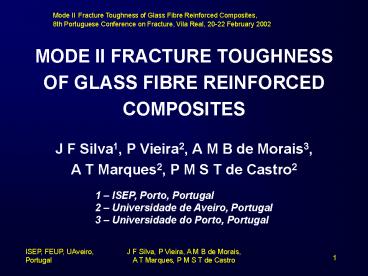ISEP, FEUP, UAveiro, - PowerPoint PPT Presentation
1 / 11
Title:
ISEP, FEUP, UAveiro,
Description:
J F Silva, P Vieira, A M B de Morais, A T Marques, P M S T de Castro. 1 ... J F Silva, P Vieira, A M B de Morais, A T Marques, P M S T de Castro. 2 ... – PowerPoint PPT presentation
Number of Views:261
Avg rating:3.0/5.0
Title: ISEP, FEUP, UAveiro,
1
MODE II FRACTURE TOUGHNESSOF GLASS FIBRE
REINFORCED COMPOSITES
- J F Silva1, P Vieira2, A M B de Morais3,
- A T Marques2, P M S T de Castro2
1 ISEP, Porto, Portugal 2 Universidade de
Aveiro, Portugal 3 Universidade do Porto,
Portugal
2
STATE OF THE ART
- several studies on fracture of laminated
composites - very little work done on filament
wound composites - special features of filament
wound composites - typically multidirectional
??n ? high susceptibility to non-linearity and
crack jumping - more heterogeneous than
laminates ? higher scatter.
3
manufacturing of glass/polyester plates- ??4
with ? 0.8, 5, 10, 30 and 60º- PTFE film at
mid-thickness to generate starter crack -
post-cure at 80 ºC during 24 h after winding.
EXPERIMENTAL PROCEDURES
4
mode II end-notched flexure (ENF) tests to
measure GIIc
5
RESULTS
linear P-? curves for ? ? 10º
6
no crack jumping, but non-linearity problems for
? ? 30º - need to reduce span (2L) from standard
100 to 40 mm - still premature yielding of
?60º4 specimens ? stiffer specimens
required - GIIc results for ?30º4 are
somewhat questionable.
7
considerable scatter, especially from insert and
for higher ? values. measurements from insert
8
measurements from mode II precrack
9
average GIIc increases with ?, except from 0.8º
to 5º
10
explanations - larger ? ? larger plastic zone
behind the crack tip ? greater GIIc - GIIc
decreases from 0.8º to 5º because - fibre
bridging is less effective? - batch variation?
11
CONCLUSIONS
- Main difficulty in testing filament wound
composites is non-linearity - larger ? ?
greater GIIc, but also larger tendency for large
scale yielding - Specimen design (stacking
sequence) can overcome problems? -subject of a
research project funded by the Portuguese
Ministry for Science and Technology (SAPIENS)






























